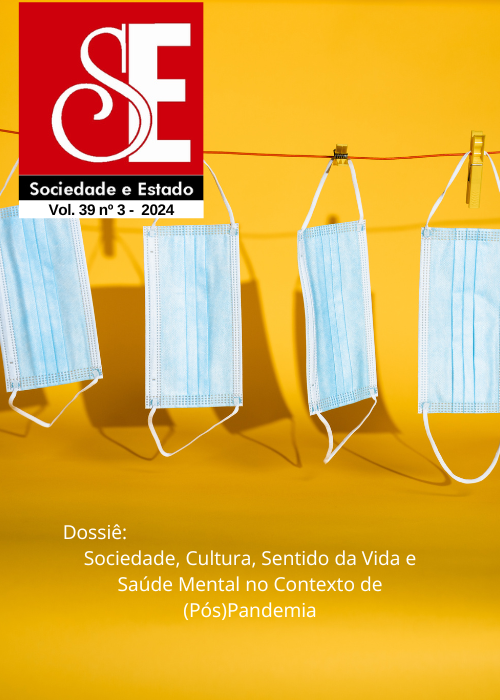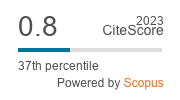Beyond psychological individualism: rethinking clinical intuition in a post-Covid age
DOI:
https://doi.org/10.1590/s0102-6992-20243903e53579Keywords:
autism; gender; masking; self-transcendence; prejudiceAbstract
Psychological science has often insisted on an individualistic perspective. Such atomised understanding of the self has moved deep in psychology, not only in its theoretical and experimental arms, but also into clinical practice. Here we give an example of how to deconstruct such myth at the micro-level: within the therapist’s office space. Thereunto, we describe the case of Renata, 28 years old, musician and singer. The case report followed CARE recommendations. We suggest four levels of analysis: a. Understanding and diagnosing Autism Spectrum Disorder; b. Neurodivergence and prejudice; c. Autism in women: Clinical bias and masking; d. Self-directedness and Intuition: overcoming social blindness. The conclusion points to the importance of Self-Directedness and Self-Transcendence for clinical accuracy when there is a gender bias problem in Autism Spectrum. Above all, the case study presents broader consequences of the psychotherapist's awakening as an agent of social change.
Downloads
References
ALMINHANA, Letícia Oliveira; FARIAS, Miguel; CLARIDGE, Gordon; CLONINGER, Claude Robert and MOREIRA-ALMEIDA, Alexander. “How to tell a happy from an unhappy schizotype: personality factors and mental health outcomes in individuals with psychotic experiences”. Braz. J. Psychiatry, p. 1-7. Jun. 2016.
ALMINHANA, Letícia O; CLONINGER, Claude Robert. Fostering well-being: Spirituality and creativity in clinical practice. In: LUCCHETTI, Giancarlo, PERES, Mario F.P.; DAMIANO, Rodolfo F. (Editors). Religion Spirituality and Health: A social Scientific Approach (From Research to Clinical Practice). First edition, Springer International Publishing, 2019.
BUSH, Hillary H.; WILLIAMS, Lindsey W.; MENDES, Eva. “Brief Report: Asexuality and Young Women on the Autism Spectrum”. J. Autism Dev. Disord. Published online. Jun. 2020.
Butler, Judith. (1999). “Corpos que pesam: sobre os limites discursivos do ‘sexo’”. In: LOURO, Guacira Lopes (Org.). O corpo educado: pedagogias da sexualidade, 2008. Belo Horizonte: Editora Autêntica. p. 151-172.
CLONINGER, C. Robert, SVRAKIC, Dragan M; PRZYBECK, T.R. “A psychobiological model of temperament and character.” Arch Gen Psychiatry, v. 50, n. 12, p. 975–990. Jan. 1993.
CLONINGER, C. Robert, SVRAKIC, NM, SVRAKIC, Dragan M. “Role of personality self-organization in development of mental order and disorder”. Dev Psychopathol, v. 9, n. 4, p. 881–906. Fall, 1997.
CLONINGER, C. Robert. Feeling Good: The Science of Well-Being. 1 edition. Oxford; New York: Oxford University Press, 2004.
CLONINGER, C. Robert; CLONINGER, Kevin M. “Person-centered Therapeutics”. Int. J. Pers. Cent. Med., v. 1, n. 1, p. 43–52. Jun. 2011.
CLONINGER, C. Robert. The importance of ternary awareness for overcoming the inadequacies of contemporary psychiatry. Rev Psiq Clín., v. 40, n. 3, p. 110-3, Apr. 2013.
DWYERA, Patrick. “The Neurodiversity Approach(es): What Are They and What Do They Mean for Researchers?”. Human Development, v. 66, p. 73–92, Feb. 2022.
ESTRIN, Georgia Lockwood; MILNER, Victoria; SPAIN, Debbie; HAPPÉ, Francesca; COLVERT, Emma. “Barriers to Autism Spectrum Disorder Diagnosis for Young Women and Girls: a Systematic Review” Review Journal of Autism and Developmental Disorders (2021) 8:454–470, Oct, 2021.
EVANS, Jonathan St. B.T. “In two minds: dual-process accounts of reasoning”. Trends Cogn. Sci., v. 7, n. 10, p. 454–459, Oct. 2003.
FRANCO, Juliana Rocha. (2015). A “virada espacial” e a semiótica: uma proposta alternativa ao pensamento binário. LÍBERO, v. 18 (n. 36), 65-76.
GAGNIER, Joel J; KIENLE Gunver; ALTMAN Douglas G, MOHER, David; SOX, Harold; RILEY, David; CARE Group. “The CARE guidelines: consensus-based clinical case report guideline development”. J Clin Epidemiol., v. 67, n. 1, p. 46-51. Jan. 2014
GAYATO, Mayra. S.O.S Autismo: guia completo para entender o Transtorno do Espectro Autista. São Paulo: nVersos, 2018.
GRANDIN, Temple; PANEK, Richard. O cérebro autista: Pensando através do espectro. Tradução Maria Cristina Torquilho Cavalcanti. Rio de Janeiro: Record, 2015.
GREEN, J. “Autism as emergent and transactional”. Front. Psychiatry. Oct 2022.
HILLMAN, J.; VENTURA, M. “We've Had a Hundred Years of Psychotherapy – and the World's Getting Worse”. HarperCollins. 1992
HONNETH, Axel. Luta por reconhecimento: a gramática moral dos conflitos sociais. 3 ed. São Paulo: Editora 34, 2009.
HORI, Hiroaki; TERAISHI, Toshiya; SASAYAMA, Daimei; MATSUO, Junko; KINOSHITA, Yukiko; OTA, Miho; HATTORI, Kotaro; KUNUGI, Hiroshi. “A latent profile analysis of schizotypy, temperament and character in a nonclinical population: association with neurocognition.” J. Psychiatr. Res., v. 48, n. 1, p. 56–64, Fev. 2014.
KIRKOVSKI, Melissa; ENTICOTT, Peter. G.; FITZGERALD, Paul. B. “A review of the role of female gender in autism spectrum disorders”. J. Autism Dev. Disord., v. 43, n. 11, p. 2584–2603, Mar, 2013.
KOPENAWA, Davi; ALBERT, Bruce. The Falling Sky: Words of a Yanomani Shaman. Harvard University Press, 2013.
LAQUEUR, Thomas. Inventando o sexo: corpo e gênero dos gregos a Freud. Rio de Janeiro: Editora Relume Dumará, 2001.
LEE, Courtney R; GILLILAND, Kurt O; DALLAGHAN, Gary LB; TOLLESON-RINEHART, Sue. “Race, ethnicity, and gender representation in clinical case vignettes: a 20-year comparison between two institutions”. BMC Med Educ. v. 30; no. 22, p. 585 Jul 2022.
LEWIS, Laura Foran; STEVENS, Kailey. “The lived experience of meltdowns for autistic adults”. Autism. v. 27, n. 6, p. 1817-1825. Jan 2023.
LOOMES, Rachel; HULL, Laura; MANDY, William Polmear Locke. “What is the male-to- female ratio in autism spectrum disorder? A systematic review and meta-analysis”. J Am Acad Child Adolesc Psychiatry. v. 56, no. 6, p. 466–474. Apr 2017
LORD, Catherine; BRUGHA, Traolach S.; CHARMAN, Tony; CUSACK, James; DUMAS, Guillaume; FRAZIER, Thomas; JONES, Emily J. H.; JONES, Rebecca M.; PICKLES, Andrew; STATE, Matthew W.; TAYLOR, Julie L. and VEENSTRA-VANDERWEELE, Jeremy. “Autism spectrum disorder”. Nat Rev Dis Primers.v. 6, n. 1. Jan. 2020.
LOURO, Guacira Lopes. “Gênero e sexualidade: pedagogias contemporâneas.” Pro-Posições, v.19, n.2, 2008.
LUKES, Stevens. “Individualism”. New York, Harper. Can. J. Philos. v. V, n. 2. Oct, 1975.
MARCON, Gilberto Hoffmann; FURLAN, Reinaldo. A questão identitária na pós-modernidade: autenticidade e individualismo em Charles Taylor. Psicologia USP, v. 31, p. e190048, 2020.
MEAD, George; MORRIS, Charles (Org.). Mente, self e sociedade. 1. ed. Trad. Maria Silva Mourão Netto. São Paulo: Ideias e Letras, 2010.
MILNER, Victoria; MCINTOSH, Hollie; COLVERT, Emma; HAPPÉ, Francesca. “A Qualitative Exploration of the Female Experience of Autism Spectrum Disorder (ASD)”
J. Autism Dev. Disord. v. 49, n. 2389–2402. Feb 2019.
PHUNG, Jasmine; PENNER, Melanie; PIRLOT, Clementine; WELCH, Christie. “What I Wish You Knew: Insights on Burnout, Inertia, Meltdown, and Shutdown From Autistic Youth”. Front. Psychol. v.12, n. 741421. p. 1-14. Nov 2021.
RICOEUR, Paul. O si-mesmo como outro. 1. ed. São Paulo: WMF Martins Fontes, 2014.
RICOEUR, Paul. Percurso do reconhecimento. São Paulo: Edições Loyola, 2006.
SILVA, C H do Carmo. The phenomenology of meditation: Commonalities and divergences between Christian meditatio and Hindu Dhyāna. In: FARIAS, Miguel; BRAZIER, David; LALLJEE, Mansur. (Eds.), The Oxford Handbook of Meditation. Oxford University Press, 2021.
SILVA, Francisco Gabriel Alves da. “’Ser diferente é normal’”: a expressividade do self de pessoas autistas em mídias sociais da internet e suas lutas por reconhecimento”. 156 f., il. Dissertação (Mestrado em Sociologia) — Universidade de Brasília, Brasília, 2021a.
SINGER, Judy. NeuroDiversity: The birth of an idea. London: Judy Singer, 2017.
Souza, Eloisio Moulin; Carrieri Alexandre de Pádua. “A analítica queer e seu rompimento com a concepção binária de gênero”. Rev. Adm. Mackenzie, v. 11, no. 3. Jun 2010
SOUZA, Renata Ferreira de; NUNES, Débora Regina de Paula. Transtornos do processamento sensorial no autismo: algumas considerações. Revista Educação Especial, v. 32, Santa Maria, 2019.
STENNING, Anna; BERTILSDOTTER-ROSQVIST, Hanna. “Neurodiversity studies: mapping out possibilities of a new critical paradigm”. Disabil Soc. v. 36, n. 9, p. 1532–1537. Oct 2021.
TAYLOR, Charles. A ética da autenticidade. São Paulo: É Realizações, 2011.
TAYLOR, Charles. As fontes do self: a construção da identidade moderna. 4. ed. São Paulo: Edições Loyola, 2013.
TAYLOR, C. Sources of the Self: The Making of Modern Identity. Cambridge, Massachusetts: Harvard University Press, 1989.
WHITELEY, Paul; CARR, Kevin; SHATTOCK, Paul. “Research, Clinical, and Sociological Aspects of Autism”. Front. Psychiatry. v. 12, n. 481546. Apr. 2021.
Downloads
Published
How to Cite
Issue
Section
License
Copyright (c) 2024 Sociedade e Estado

This work is licensed under a Creative Commons Attribution 4.0 International License.











